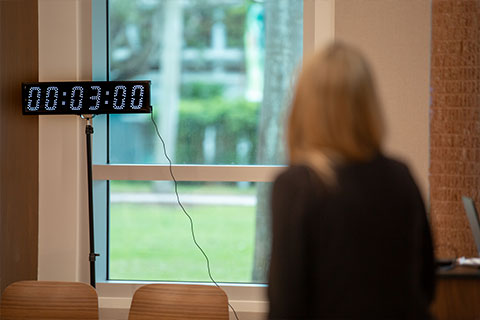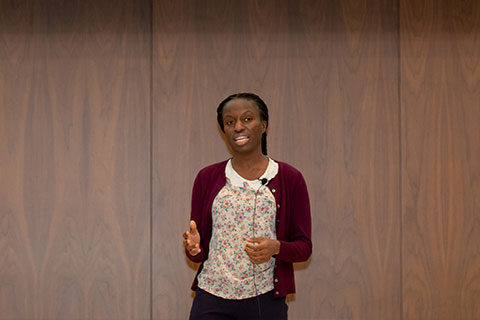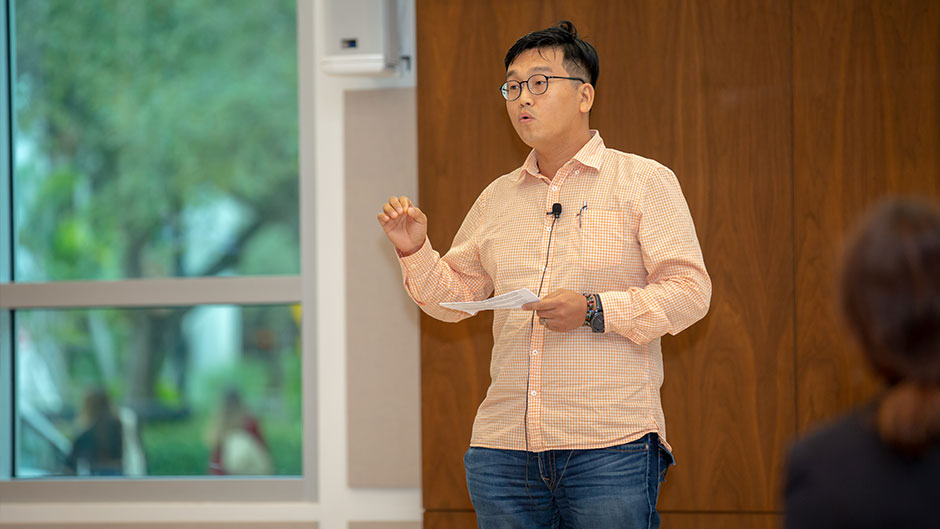Emily White believes she has found the “superhero” molecule, otherwise known as estrogen. White, an exercise physiology Ph.D. candidate in the University of Miami’s School of Education and Human Development, found that when female athletes have higher levels of estrogen, it helps protect them from debilitating muscle damage.
“Our data is suggesting that estrogen protects the muscle from exercise-induced damage,” White said. “It is time to shine a spotlight on women in physiological science.”
Meanwhile, master’s candidate Konstantina Kritharidou in the School of Architecture has created plans for a transformable structure that will adapt to a moving, melting glacier. Viviane Machado Andrade, a molecular and cell biology Ph.D. candidate in the Miller School of Medicine, has found a new cell population that hides HIV in the body, which could help scientists find a cure for the virus. Engineering Ph.D. candidate Thomas Cadenazzi spent a year studying a newly engineered “everlasting” bridge that is able to withstand corrosion. These are just a few of the topics that University of Miami graduate students have investigated in their thesis and dissertation projects recently.
These students, along with six others, will compete to capture the audience’s attention as they present their findings in the Graduate School’s third annual Three-Minute Thesis Competition on Wednesday, Feb. 6 in the Kislak Center from 6 to 8 p.m. At the event, 10 students from nearly every UM school and college will present their final projects in a timed, three-minute pitch to a panel of judges.

At the conclusion of the presentations, the judges and audience will vote to determine the winners. The top winner will receive a cash reward, along with the runner-up and the student with the audience’s highest praise, said Graduate School communications specialist, Laura Lopez Ramos.
Graduate School administrators are ecstatic that this year’s competition has the largest amount of contestants yet, with students from nearly every school and college, showcasing the breadth of research at UM.
“The Three-Minute Thesis competition is great because it is so diverse,” Lopez Ramos said. “You jump from economics and marketing, to coral reefs, to philosophy and then AIDS research in a 40-minute span. It’s fascinating what these students are doing…it’s a little potpourri of their research, all in less than an hour.”
Another goal of the event is to help students learn how to vocalize their very complex — often multi-year — research projects in a simple way, which is often a great skill to acquire for future careers.
“Being able to communicate their academic work to non-specialists is a critical professional skill,” said Tatiana Perrino, associate dean of the Graduate School. “Through the Three-Minute Thesis competition, graduate students can prepare to engage in dialogues with community members, the media, policymakers, as well as researchers across all disciplines. It really can enhance the impact of their work.”
Jillian Drabik, a Ph.D. candidate in Environmental Science and Policy, spent more than two years following the implementation of a statewide policy to improve the ecosystem of Everglades National Park. Drabik examined the collaboration between scientists, water management officials and the public within the massive South Florida Water Management region, which extends north to Palm Beach County. She said participating in the competition was useful because it forced her to simplify her research.

“It was a very good experience to work on condensing a topic that is so complex into something easy to understand and that can be communicated quickly,” she said.
The Three-Minute Thesis competition originated at University of Queensland in 2008 when Australia was suffering from a drought. Citizens were asked to take three-minute showers and the dean of the graduate school thought the time limit could apply to other concepts, such as summarizing a research project. Thus, the idea for the competition was born.
For a full list of the competitors, visit the Graduate School’s Three-Minute Thesis Competition webpage. Also, for those interested in attending the Three-Minute Thesis competition, register here.

